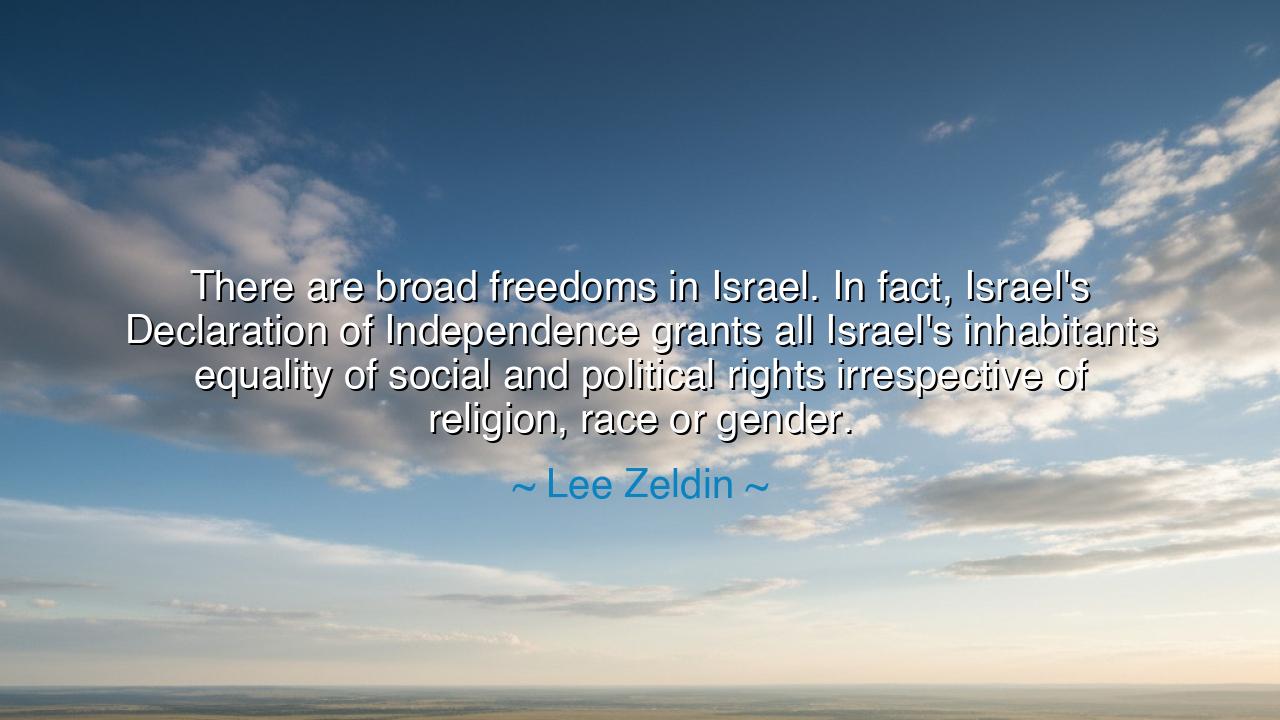
There are broad freedoms in Israel. In fact, Israel's Declaration
There are broad freedoms in Israel. In fact, Israel's Declaration of Independence grants all Israel's inhabitants equality of social and political rights irrespective of religion, race or gender.






“There are broad freedoms in Israel. In fact, Israel’s Declaration of Independence grants all Israel’s inhabitants equality of social and political rights irrespective of religion, race or gender.” Thus spoke Lee Zeldin, a statesman who, though born far from the ancient hills of Judea, recognized in Israel a living testament to the endurance of liberty amidst adversity. In his words shines both reverence and reminder — that freedom, once won through sacrifice, must be preserved through principle; that true democracy is not measured merely by power or prosperity, but by the dignity and equality it affords to every soul beneath its banner.
To understand the depth of his statement, one must return to the birth of Israel in 1948, a moment when a people long scattered across the earth gathered again to build a nation upon the ashes of exile. When the Declaration of Independence was proclaimed in Tel Aviv, it was not simply the announcement of a state, but the rebirth of a promise — that those who had suffered persecution and displacement would now create a homeland rooted in justice, freedom, and equality. In that founding document, the leaders of the new nation swore that all inhabitants, regardless of religion, race, or gender, would share equally in the rights and protections of citizenship. This was a radical declaration, for it emerged not in peace, but in the shadow of war and survival — and yet it spoke with the timeless voice of human dignity.
Throughout history, nations have proclaimed freedom, but few have done so at such a cost. The people of Israel, newly born yet ancient in spirit, stood surrounded by enemies and beset by hardship. Yet within that crucible, they chose not vengeance, but vision — to enshrine broad freedoms as the foundation of their state. They knew, as the ancients knew, that the measure of a people’s greatness is not in its conquests, but in its compassion; not in the strength of its walls, but in the openness of its laws. Zeldin’s words remind us of this eternal truth: that liberty which excludes is not liberty, but privilege, and that the truest strength of a nation lies in its moral resolve to defend the rights of all who dwell within it.
Consider the tale of Golda Meir, Israel’s first female prime minister — a living embodiment of that founding promise. Born in poverty in Kiev, raised in the immigrant quarters of Milwaukee, and rising to lead a young nation under fire, she was proof that Israel’s commitment to equality was not mere rhetoric, but reality. Her leadership, in times of both crisis and triumph, stood as a beacon to women around the world, showing that gender, once a barrier, could become a symbol of courage and capacity. Through her, and through countless others who served their nation in faith and labor, the principles of the Declaration took form in the flesh and spirit of a free people.
Yet even as we honor these ideals, we must not forget that the work of liberty is never finished. Zeldin’s statement carries a warning as well as praise. For freedom, if left unattended, withers like an untended vine. Equality, if taken for granted, becomes a slogan rather than a covenant. Every generation must recommit to the ideals that gave it birth, and every citizen must guard against the slow corrosion of prejudice and indifference. The broad freedoms of Israel — and of all democratic nations — endure not by law alone, but by the daily courage of conscience, by the willingness to see one’s neighbor not as rival or stranger, but as fellow inheritor of the same sacred rights.
The ancients taught that justice is the harmony of the soul and the city alike. So too does this principle live in modern Israel — imperfect, contested, yet enduring. The promise of equality “irrespective of religion, race, or gender” is not a destination reached once, but a path walked endlessly. For every nation that aspires to greatness must look within and ask: Do we still honor the ideals of our founding? Do we still see in one another the image of the divine? If the answer is yes, then the spirit of freedom lives still; if not, then the task before us is clear.
So, my child of the present age, take heed of this wisdom: freedom is not the inheritance of comfort, but the labor of conscience. Cherish it, defend it, and expand it, for every right preserved by one generation becomes the inheritance of the next. Let Zeldin’s words remind you that the worth of a nation lies not in its might, but in its mercy; not in the walls it builds, but in the hearts it uplifts. Wherever there is division, build understanding. Wherever there is injustice, speak. And wherever the flame of equality burns dim, breathe upon it with faith and action, until it burns bright once more.
For in that flame — the flame of liberty and equality — lives the hope of every people, and the promise of every age.






AAdministratorAdministrator
Welcome, honored guests. Please leave a comment, we will respond soon